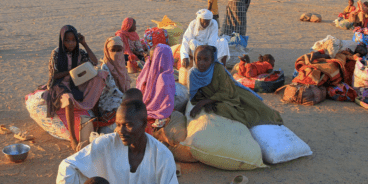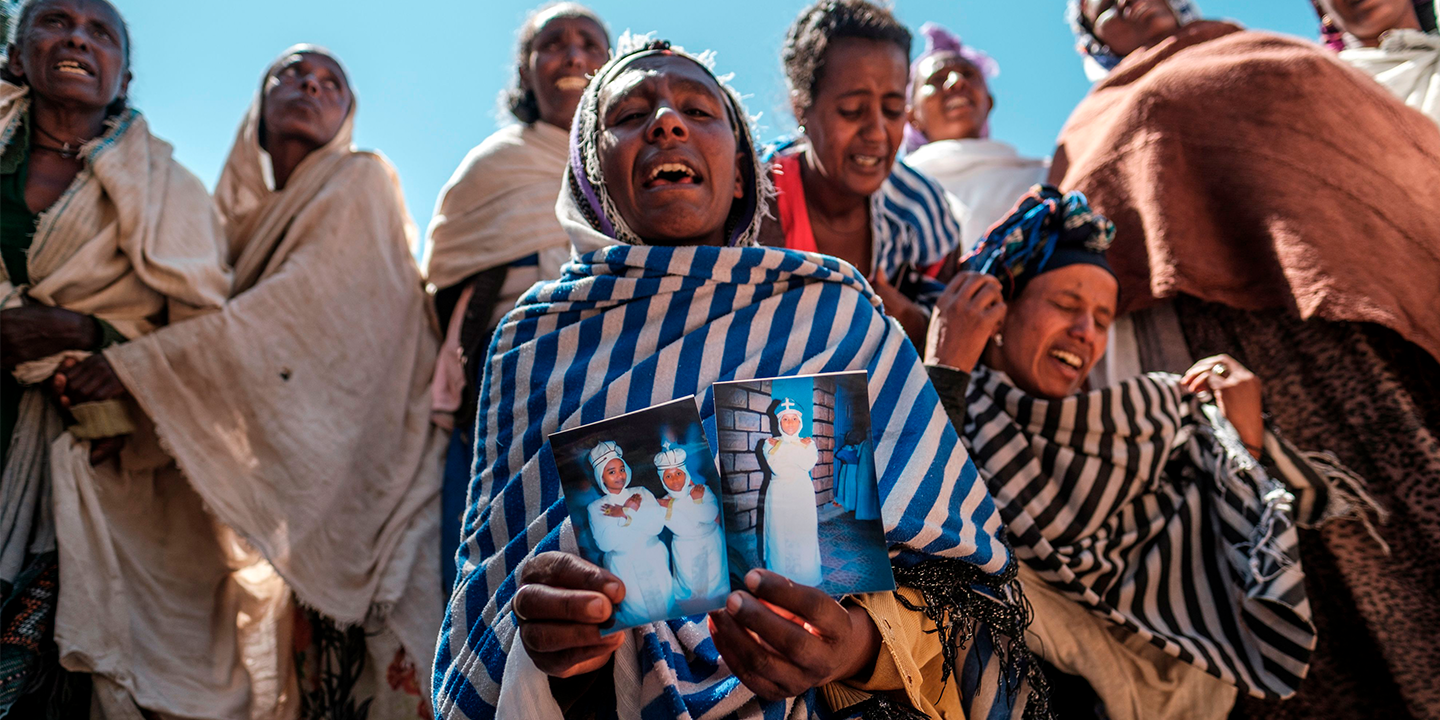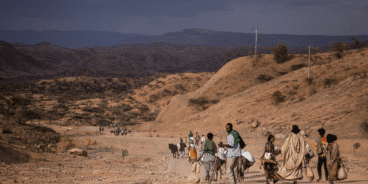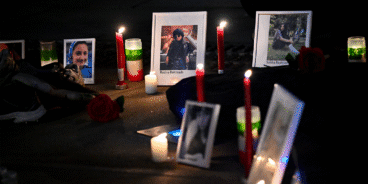

Ethiopia five years on: Justice eludes victims of atrocities in Tigray and beyond
Civilians in Ethiopia have endured enormous suffering deriving from long-standing ethnic, intercommunal and political tensions, which escalated after Prime Minister Abiy Ahmed came to power in 2018, and the outbreak of conflict in the Tigray region in November 2020. Investigations by the United Nations, international human rights organizations and Ethiopia’s own Human Rights Commission have documented widespread atrocities by all parties to the conflict, amounting to war crimes, crimes against humanity, and, in Western Tigray, ethnic cleansing. Abuses include the deliberate targeting of civilians, indiscriminate shelling of civilian areas, widespread sexual and gender-based violence — including sexual and reproductive violence with the explicit intent to destroy Tigrayan women’s reproductive capacity and the intent to destroy the Tigrayan ethnicity — starvation used as a weapon of war and forced displacement. In Western Tigray, authorities and associated militias engaged in systematic campaigns of violence and expulsions against the Tigrayan population, which Amnesty International and Human Rights Watch found to constitute ethnic cleansing.
Despite the signing of the November 2022 Cessation of Hostilities Agreement (COHA), impunity prevails, and victims and survivors remain without redress. Accountability efforts have been inconsistent, politically compromised or prematurely shut down, including the quiet closure of the African Commission on Human and Peoples’ Rights’ Commission of Inquiry on Tigray without the release of a public report, and the termination of the UN International Commission of Human Rights Experts on Ethiopia following intense lobbying by the Ethiopian government. These gaps in international oversight have denied survivors meaningful paths to justice, while enabling impunity for perpetrators. More than two years after Ethiopia’s Ministry of Justice endorsed transitional justice recommendations, violence continues to escalate across the country, eroding hopes for peace and rendering accountability increasingly elusive — including the implementation of both the transitional justice framework and the COHA.
Conflict has continued to intensified in Oromia, where credible reports indicate senior officials have ordered extrajudicial killings, illegal detentions, forced disappearances, prolonged prison and forced conscription. In Amhara, violence between an ethnic-based militia and the federal government has killed hundreds of civilians, including through extrajudicial and summary executions and drone strikes by federal forces. Both state security forces and armed groups have targeted populations along ethnic lines, deepening grievances and sowing the seeds for further atrocities. According to the Office of the UN High Commissioner for Human Rights (OHCHR), at least 1,351 civilians were killed in Amhara and Oromia between January 2023 – January 2024 in attacks reportedly perpetrated by federal and regional government forces and myriad armed groups. Government forces were responsible for at least 70 percent of these abuses. Killings of civilians and sexual violence continue to remain pervasive in conflict zones, with Physicians for Human Rights and the Organization for Justice and Accountability in the Horn documenting the widespread use against communities in Tigray, Amhara and Afar. A lack of atrocity prevention in Tigray has fueled the spread of sexual violence in these other regions.
Meanwhile, survivors lack access to comprehensive health services and humanitarian relief, as health care facilities need support for reconstruction and rehabilitation to strengthen the availability, accessibility, acceptability and quality of services.
The situation for those internally displaced by the conflict remains dire, with options for return slim. In Tigray alone, an estimated 878,000 people remain displaced. Meanwhile, cuts to global aid funding have deepened barriers to services and exacerbated harm. The federal government also continues to restrict civic space and threaten human rights organizations, defenders and independent media, tightening its grip on those who seek to hold the authorities to account. These efforts have intensified in the lead up to elections slated for December 2025.
These ongoing abuses, together with rising regional tensions, illustrate the failure of Ethiopia’s authorities to fully engage in a transitional justice process and protect civilians, ensure accountability or address the root causes of violence. Consequently, Ethiopia remains trapped in a cycle of impunity and the persistent risk of renewed atrocities.
To break this cycle and safeguard human rights, we urge the international community to:
- Renew and Support Independent Monitoring: Reinstate and strengthen impartial international mechanisms to document ongoing violations in Tigray, Amhara, Oromia and beyond. OHCHR should also ensure consistent human rights monitoring and reporting in Ethiopia.
- Strengthen Civilian Protection: Expand humanitarian access and protection strategies in Amhara and Oromia, ensuring life-saving aid and independent monitoring reach affected populations without delay or obstruction.
- Ensure Unhindered Humanitarian Access and Protection for IDPs: Invest in durable solutions for IDPs across the country — including safe return, local integration and access to essential services — grounded in human rights and aimed at preventing the recurrence of violence.
- Ensure Survivor-Centered Justice: Prioritize justice processes that center the rights and needs of victims and survivors, ensuring inclusive, independent mechanisms for truth-telling, reparations and psychosocial support.
- Pursue Accountability at Multiple Levels: Support international or hybrid justice processes capable of prosecuting atrocity crimes, including through universal jurisdiction, while bolstering Ethiopia’s capacity for independent investigations and trials.
- Protect Human Rights Defenders, Civil Society, and the Media: Defend the rights of local human rights defenders, independent journalists and civil society organizations to document abuses, advocate for survivors and hold all actors accountable.
The international community’s response to the atrocities in Ethiopia has too often been marked by delay and deference. However, the scale and gravity of these crimes, both past and ongoing, demand urgent and decisive action. Without accountability, atrocities are bound to recur, and the already fragile promise of transitional justice may collapse. To prevent further atrocities, the international community should make the prevention of a relapse into war in Tigray — and between Ethiopia and Eritrea — an urgent moral, political and legal priority.
We therefore urge member states, multilateral institutions and donors to recommit to the principles of justice and civilian protection, and to ensure that Ethiopia does not remain a blind spot in global atrocity prevention efforts.
- Coalition for Genocide Response
- GEMTigray
- Global Centre for the Responsibility to Protect
- International Bar Association’s Human Rights Institute
- Irob Anina Civil Society
- Legacy Tigray Advocacy Group
- Legal Action Worldwide
- Omna Tigray
- Oromo Legacy Leadership and Advocacy Association
- Pan African Agenda Institute (PAAI)
- Physicians for Human Rights (PHR)
- Tigray Accountability Coalition
Related Content


Ethiopia on the Brink: International community must act urgently to prevent mass atrocities
